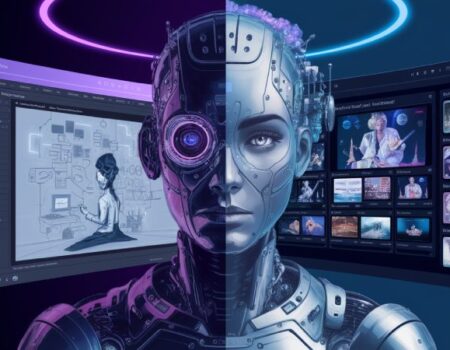How to Use AI for A More Effective Social Media Strategy, According to Ross Simmonds
Welcome to our creator columns, we created this so you can get the insights from Engage Coders to help you grow smarter and faster.
We’re living in the AI era, and as marketers, it’s essential we stay ahead of the curve.
At Foundation Marketing, my team recently ran an AI Marketing study involving hundreds of professionals. The results? Over 84% of SEO experts, managers, leaders, and specialists reported using
AI tools for marketing in their daily workflows.
Forget the fearmongering headlines — AI is actually boosting the performance and productivity of social media marketers. Translation: AI is your ally. I’d even bet that by the end of the year, nearly every marketer will be using it — or risk falling behind.
AI and social media stand as two of the most transformative forces of our generation. While social media has redefined communication, AI is fundamentally reshaping how we get work done.
That’s why I’m sharing some key findings, frameworks, and resources that my team at Foundation has built over the past year — all designed to help you tap into the synergy between AI-powered recommendations and social platforms.
Let’s get into it.
What Role Does AI Play in Today’s Social Media Strategy?
On a recent episode of my podcast Create Like The Greats, I explored how AI tools are changing the landscape for social media professionals. You can listen to that conversation here:
Let’s break down some of the specific advantages this tech brings:
Why AI in Social Media Is a Game-Changer
Think of AI in social media as the conductor of an orchestra — seamlessly managing automation, audience engagement, personalization, and content creation in perfect harmony. Its potential is massive, though only a few marketers are truly mastering the art.
From streamlining data analytics to deploying chatbots that improve customer interactions, AI tools for marketing are revolutionizing how we connect and convert. Whether it’s generating content ideas, scheduling posts, or delivering AI-powered recommendations, AI is now a central part of any strong social media strategy.
Using AI to Conduct Customer Research
Imagine you’re not just building a social media strategy, but wielding the digital equivalent of Indiana Jones’ whip—unearthing customer behaviors, preferences, and patterns buried deep in content, comments, and reviews.
This is exactly where AI in social media excels.
Let’s say your business has gathered 2,000 reviews on platforms like Google, Yelp, or Capterra. Traditionally, this would take weeks to analyze. But now, with AI tools for marketing, you can generate an insightful summary within minutes.
Just download the reviews into a document, upload them to your favorite Generative Pre-trained Transformer (GPT), and let it uncover themes, trends, and actionable insights.
Want to go even deeper?
Become your brand’s Prompt Engineer. Let’s say your audience includes kombucha-loving marathoners. You can prompt ChatGPT to build a full persona including:
- Demographics
- Psychographics
- Consumer behaviors
- Needs and preferences
Plus, you’ll get tailored marketing recommendations.
And that’s just the beginning.
AI leverages data analytics to go far beyond the surface. From parsing social media data to powering chatbots that gather real-time feedback, it helps brands deliver next-level personalization and AI-powered recommendations across channels.
Whether you’re focused on audience engagement, content creation, or automation, using AI in social media isn’t just smart—it’s revolutionary.
Social Media Content Using AI
Let’s face it—content creation every month can be exhausting. But AI tools for marketing, especially in the realm of AI in social media, are easing the pressure.
Instead of manually writing every post, tools like HubSpot’s AI social media caption generator can instantly generate copy for you—just input your idea and let the tool do the rest.
And the magic doesn’t stop at a single platform. Whether it’s LinkedIn, X, Facebook, or Instagram, your AI content assistant adapts your social media strategy for each one—complete with optimized hashtags.
AI-powered content isn’t here to take jobs—it’s here to sharpen focus. Human marketers get to concentrate on where they shine: delivering storytelling and creativity that truly connect.
Enhanced Personalization
You ever get a message from a brand and think, “Wow, they get me”? That’s personalization powered by data, not coincidence.
Where companies used to employ full teams for social listening, AI tools can now engage with users across platforms instantly and at scale.
AI in audience engagement means that even a small team can match the outreach power of massive legacy brands, thanks to smarter, faster automation.
The end result? Conversations that feel more genuine—because they’re backed by data-driven insights and fast responses.
Analytics and Insights
Imagine trying to decipher your data without help—it’d take forever. With AI, data analytics becomes less guesswork and more laser-precision.
Want to analyze your social media strategy? Feed AI tools a report from LinkedIn, and they’ll break down your content performance, show what’s resonating, and suggest how to improve.
This is AI to conduct customer research in action. What once took hours now happens in minutes, unlocking smarter strategies and faster decisions.
Even huge datasets—think thousands of rows—are no match. Upload, analyze, and receive AI-powered recommendations tailored to boost your results.
Chatbots
Let’s not forget the game-changers: chatbots. They’re not just digital receptionists—they’re real-time assistants improving your brand’s responsiveness.
Backed by AI in social media, chatbots keep conversations moving, whether it’s answering questions, guiding product selection, or providing on-the-spot support.
AI in Social Media: Building a Strategy That Works
Integrating AI into your social media strategy isn’t just about using new tools — it’s about fundamentally transforming how your brand engages with audiences and delivers content. But before diving into the deep end, it’s critical to build a solid foundation.
Start by defining clear objectives. These should tie AI tools for marketing to specific outcomes like better audience engagement, stronger content creation, or more efficient automation. Once your goals are set, validate any assumptions you have about what AI can and cannot do.
Next, get to know your audience inside out. Leverage AI to conduct customer research and uncover trends in behavior, preferences, and content consumption across platforms. With this data, choose the most relevant channels and start mapping your social media strategy around where your audience already spends time.
Measurement is everything — identify KPIs tied to both your AI tools and platform performance. Then, select AI solutions that align with those metrics, whether that’s for data analytics, campaign automation, or AI-generated content.
Lastly, don’t “set and forget.” Keep refining and testing your strategy. As both AI and social platforms evolve, so should your roadmap.
24/7 Engagement with Chatbots and Automation
Need always-on support? AI-powered chatbots make it possible to provide improved customer service around the clock — without a live agent. Whether it’s Facebook Messenger or Instagram DMs, automation in direct messaging is changing the game.
These AI-driven bots are smarter than ever. Trained on past queries and fed with real-time data analytics, they help predict and solve customer issues faster. For social media managers, this is a huge time-saver and an opportunity to deliver better experiences with less manual effort.
AI-Powered Advertising: From Copy to Bidding
When it comes to advertising on social media, AI is no longer just behind the scenes — it’s front and center.
Most platforms have already been using AI to optimize bidding. But now, brands are leveraging AI tools for marketing to elevate their creative game too. Want scroll-stopping visuals? Tools like
Midjourney or DALL·E can generate visuals in seconds. Need more compelling messaging? Use AI to craft high-performing ad copy instantly.
From A/B testing to AI-powered recommendations, the world of paid social is getting sharper, smarter, and faster.
Roll up your sleeves — combining AI in social media with a strong strategy puts your brand in a prime position to lead, not follow. Get started today and watch your audience engagement and results scale like never before.
Start With the Right Channels for Your Strategy
Not all platforms deliver the same value — knowing where your brand fits is key to any strong social media strategy. Before jumping in, evaluate where your audience actually engages. That’s how you’ll get the best results from AI in social media.
On LinkedIn, for instance, AI tools for marketing can help you turn blog posts into engaging carousel PDFs. On X, those same tools might assist in crafting long-form threads packed with data. The content creation method and tone differ drastically by platform — and so does how AI supports it.
Pick your platforms wisely, then map your tools and strategy accordingly.
1. Know Your Audience with AI-Backed Research
Understanding your target audience is the backbone of any marketing plan. AI helps uncover insights faster than ever, making AI to conduct customer research an invaluable part of the process.
Still, you need to know the fundamentals of audience building. Once you’ve got the basics down, layer in AI to go deeper: What are their behaviors? What content resonates? Where are the gaps?
That’s where data analytics shines — combining numbers with context to refine your messaging and outreach.
2. Validate Before You Scale
Jumping headfirst into any tech — even powerful AI tools for marketing — can backfire if you’re relying on guesswork.
Don’t assume AI will solve every issue or automatically improve audience engagement.
Instead, run small tests. Experiment. Track real outcomes. Let the data shape how you integrate AI into your social media strategy long term.
3. Define Goals That Align With AI Capabilities
Before introducing automation, personalization, or chatbots into your process, get crystal clear on your goals.
Want to boost reach? Drive conversions? Simplify content creation? You’ll need those answers first.
Let’s say your agency wants to grow LinkedIn presence. Knowing that helps you pinpoint which AI tools for marketing support repurposing blog content or writing better ad copy.
Once goals are clear, the right tools and AI-powered workflows become much easier to adopt — from ad optimization to real-time AI-powered recommendations.
4. Get Buy-In and Build Smarter
After setting goals, align your team. Understand the tools available in the market. Test, analyze, and scale.
You’ll create a smarter, more effective AI-driven plan — one that doesn’t just follow trends but delivers measurable results in AI in social media.
5. Choose the Right AI Tools for Your Workflow
In the growing universe of AI tools for marketing, not every tool is built equally — or for your specific needs.
Whether you’re a startup owner, a solo creator, or managing an enterprise social media strategy, picking tools that match your goals and comfort level with technology is critical.
Say you’re a food blogger sharing creative pizza recipes. Instead of spending half an hour drafting a catchy post, you could use HubSpot’s AI social media caption generator to get compelling content in seconds.
This AI solution is trained on a wealth of content creation data, giving you smart suggestions or ready-to-post captions, tailored to the platform. That’s the magic of AI in practice: speed, ease, and relevance.
When choosing tools, evaluate factors like cost, ease of use, available integrations, and customer support. The right tech stack can transform how you use AI for automation, personalization, and more.
Partner with our Digital Marketing Agency
Ask Engage Coders to create a comprehensive and inclusive digital marketing plan that takes your business to new heights.
Contact Us
6. Identify the Metrics That Matter Most
What are you aiming to move the needle on?
Before any tool or tactic gets deployed, it’s essential to define success. Setting the right key performance indicators (KPIs) will ensure your AI in social media efforts are tied to real impact.
Here are a few important ones:
- Reach: How many unique users are actually seeing your content? This metric helps assess how visible your brand is across platforms.
- Clicks: Whether it’s a blog link, landing page, or profile visit, clicks show what’s sparking interest or buyer intent.
- Engagement: A ratio of interactions to impressions, this tells you how well your audience engagement is holding up and whether your messaging is resonating.
Your core KPIs might vary depending on your business model, but defining them upfront helps ensure your data analytics and AI usage are laser-focused on what actually matters.
The goal? Ground your entire AI-powered social media strategy in measurable, strategic metrics that help you learn, improve, and grow.
7. Continuously Optimize Your AI-Driven Social Media Strategy
Think of AI not as a one-click fix, but as a toolkit full of evolving capabilities.
To get the most from your AI in social media efforts, you’ll need to experiment, adapt, and refine your approach as results unfold.
If a campaign doesn’t meet expectations, use data analytics to pinpoint where things fell short. Is your audience engagement lacking? Maybe it’s time to leverage AI tools for marketing that specialize in optimizing post structure, tone, and timing.
Let AI enhance the areas where you see friction — whether it’s in content creation, scheduling, or campaign targeting.
Future-Proof Your Social Media Strategy With AI
The intersection of AI and social media strategy is transforming the game. From AI to conduct customer research to delivering AI-powered recommendations and deploying chatbots for real-time conversations — there are endless ways to future-proof your approach.
This is one of the most exciting evolutions in digital marketing.
Keep learning. Stay flexible. And above all, let automation and personalization work together to keep your strategy sharp, relevant, and scalable.








